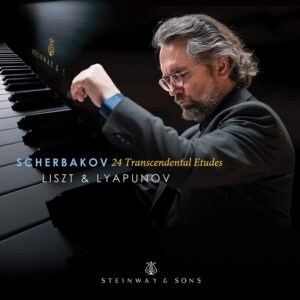So far as I can tell, this release marks the first time that both Liszt and Lyapunov sets of Twelve Transcendental Etudes have been paired on disc. Given the luscious sonority and opulent power that Konstantin Scherbakov summons in concert, his performances of the first two Liszt pieces come off surprisingly dry and “notey”, where small details prevail and the big, sweeping picture recedes. However, Mazeppa’s rapid middle-register chords are uncommonly poised and clear, in contrast to the scrambled, clattery effect one often hears. Although Feux follets is not so scintillatingly brisk in the manner of the still-unmatched Richter and Nojima paradigms, Scherbakov’s imaginative pedaling and original rubatos shed poetic light on a piece that all too often is treated like an athletic event rather than a miniature tone poem.
The same holds true for No. 10, where Scherbakov balances the yearning melody and cascading triplets in thoughtful perspective. The pianist does well in the heroic sixth, seventh, and eighth studies, although occasionally clipped phrasings dissipate much of Wilde Jagd’s inherent ferocity; I suspect that a more resonant ambience would have helped matters. Numbers nine, eleven, and twelve satisfyingly showcase the pianist’s intelligent pacing and lyrical gifts.
In short, Scherbakov channels his considerable technique toward musical ends, in the manner of similarly conceived Liszt Transcendental Etude cycles from Kirill Gerstein and Nelson Goerner. Listeners wanting more fire and brimstone in the mix should stick with Daniil Trifonov, Freddy Kempf, the classic mono Geroges Cziffra version, or Lazar Berman’s second pass (ratty sonics and all). For an ideal mix of bravura and musicality, Claudio Arrau and Laszlo Simon (a/k/a Joyce Hatto) remain reference points.
Scherbakov first recorded Lyapunov’s Transcendental Etudes back in 1993 for Marco Polo, and his new Steinway & Sons versions make for fascinating comparison. Sonically speaking, Steinway’s closer, fuller-bodied perspective differs from Marco Polo’s slightly distant yet more realistic concert hall perspective (I’ll refer to Marco Polo as Scherbakov I and Steinway as Scherbakov II). In the opening Lullaby, Scherbakov I spins out the lovely melodies to more animated and lilting effect, and Scherbakov II pushes less precipitously while building Rondes des Fantomes’ climax. Carillon now takes on an impetuous edge, although Scherbakov I’s faster Summer Night is lighter in texture. No question that No. 6’s stormy evocations benefit from Scherbakov II’s harder-hitting accents and stronger contrasts of mood, but Scherbakov I brings greater ferocity and sweep to the epic final etude, particularly in the central section’s rhetorical outbursts.
A clear-cut choice between Scherbakov I and II is difficult to ascertain, especially with both readily available, not to mention Vincenzo Maltempo’s altogether stunning version on the Piano Classics label. One also should mention the vivid booklet notes by Classicstoday.com’s own Jens F. Laurson.
































